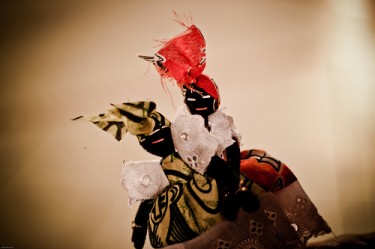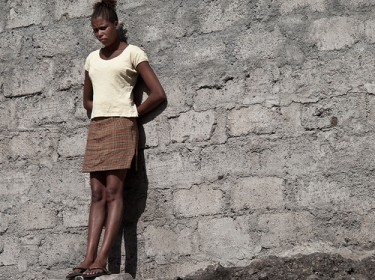[All links lead to sites in Portuguese.]
Set over the course of seven weeks, a creative writing competition promoted by the young Cape Verdean journalist Odair Varela on his blog, Crioulo n'Descontra, has led a dozen word lovers from three different continents to get behind their keyboards and let their imaginations flow.
The competition was launched at the end of March [en] to ?promote a taste for writing and for linguistic and artistic evolution?. Odair suggested a set of four challenges; the responses, written in either poetry or prose, were published on his blog.
On 9th May the winners were announced, determined by counting the number of views their texts had received. This article will provide an overview of the stories told.
What will Cape Verde be like in 2090?
In the first challenge, competitors were asked to imagine possible routes for Cape Verde in terms of sustainable development, energy, environment and climate change. Anete Carvalho wrote ?Pa?s Museu? (Museum Country), Jos? Soares posted a poem, ?Verdes eram as ilhas?, (The Islands were Green), and ?Retrospectiva 2012-2090? (2012-2090: Retrospective) was written by Silvianne Spencer. The piece with the most views was a poem written by Suruk Rodrigues:

Men of the Atlantic. Photo by Martin Edstrom copyright Demotix (27/07/2008).
Constr?i-se uma terra de bet?o.
E do sonho cultivado, colhe-se desilus?o!
Que caia chuva, para transbordar apenas
barragens cheias de l?grimas dos que choram em v?o!
A land is built from concrete.
And from the dream grown, disappointment is harvested!
Let the rain fall, and allow the reservoirs
filled with the tears of those who cry in vain to overflow!
Different approaches to tourism were also portrayed in several texts, such as that of Let?cia Varela, written in Galician and entitled ?Rel?gio do Tempo? (Time Clock). The possible extinction of Cape Verdean Creole was alluded to in the pieces by?Nani Delgado, ?N?o Vou Ficar? (I Will Not Stay), and by Ary Rodrigues, ?Um Povo Sempre Escravo? (A Nation Forever A Slave), which also talks about the country's economic growth and the influences of China.
Carla Gon?alves tells the story of an anthropologist and researcher who, in 2090, finds the book ?A Morabeza das Ilhas Crioulas' (The Morabeza of the Creole Islands), which has a ?clear cover that features stunningly beautiful white dunes; beautiful moraines and flowers with mountains towering in the background?, causing him to search for the meaning of ?morabeza?. He travels to the islands; when he arrives, however, the last remaining inhabitant says ?N?o h? mais Cabo Verde? (Cape Verde is no more):
Eis que Nh? Chico lhe responde num ingl?s rudimentar: Morabeza era a nossa ess?ncia, a m?sica, a saudade. Morabeza eram as nossas crioulas, uma diferente da outra, mas todas ?nicas. Morabeza eram as nossas praias de areias brancas e negras, as montanhas fortes e imponentes, a simpatia e acolhimento. Morabeza eram as flores, a diversidade cultural, a dan?a. Morabeza era aquilo que nos distinguia, que nos fazia ?nicos. Mas isso acabou e n?o h? mais aquele Cabo Verde?
Nho Chico spoke to him in broken English: Morabeza meant our essence, our music, our desires. Morabeza meant our creole women, each one different from the others, all unique. Morabeza meant our beaches covered in black and white sands, our strong, imposing mountains, our friendliness and hospitality. Morabeza meant flowers, cultural diversity, dance. Morabeza was what distinguished us, what made ??us unique. But now it's over and Cape Verde is no more?
Murder and escape

Dolls from Cape Verde. Photo by Wanaku on Flickr (CC BY-NC-ND 2.0)
?Someone has to be killed, and that's your task?, states the second challenge, which encourages the use of fast-paced prose to deliver crime, action and lots of gore.
From the boss murdered by an indignant ex-employee, the beautiful brunette who succumbed to the poison of a Loxosceles anomala spider, the ?Grande Mist?rio da Boneca Assassina? (The Mystery of the Murdered Doll), to the crime of passion and the classic butler mystery, but there was still room for a coup d'?tat from the revolutionaries, and for the introduction of the movement of the ?indignados? in Cape Verde, as Suruk Rodrigues wrote in the story of Zeca:
Zeca sofria com persegui??o pol?tica dos novos tempos, que poucos entendem, ou seja, na rua era bandido, na escola era drogado, e n?o conseguia bolsas de estudo, est?gio, trabalho ou coisa melhor. Arquitectou com genialidade o movimento dos indignados de Soncent com sede e ac??o no Mindelo, que no m?s de Julho de 2012 vinha a ocupar as manchetes dos jornais neoliberais numa dura persegui??o aos ?fascistas? e entre eles o pai da sua amada.
Zeca suffered from a newfound political persecution, which few understood. In other words, he was a criminal in the street, a drug addict in school, and he couldn't get scholarships, an internship, work or anything better. He had the brilliant idea of starting the movement of the outraged of Soncent, based in Mindelo. In July 2012 he came to be in the headlines of neoliberal newspapers in a stringent persecution of ?fascists?: among them, the father of his beloved.
He ends up being stabbed in the back by his future father-in-law in a public square, in full view of everyone.
Who killed Eva?
More crime to inspire the authors, but this time the challenge profiles the suspects of the murder of Eva Sequeira, a fifty-something-year-old wealthy widow who was found dead in her mansion.

Everyday life in Cape Verde. Photo by Nuno Lobito copyright Demotix (12/02/2008)
The suspects include ?Eva's stepdaughter, who she never got on well with?, the ?retired doctor who had been in love with Eva since childhood (although it was never reciprocated)?, the ?young, good-looking stranger?, the ?butler's son who was devoted to C?rmen [the stepdaughter]?, and Eva's best friend:
No final do interrogat?rio, o investigador Nataniel Borges prendeu dois suspeitos sob acusa??o de cumplicidade na morte da senhora Eva Sequeira. Quem foi para a cadeia? Quais os motivos que os levaram a cometer t?o horrendo crime?
At the end of the interrogations Detective Nataniel Borges arrested two suspects on the grounds of involvement in Eva Sequeira's murder. Who was sent to jail? What forced them to commit such a horrendous crime?
The story with the most views, written by Margareth Lima, blamed Eva's best friend for committing a crime of passion:
?eu amei aquela vadia desde o dia em que a conheci. Sofria cada vez que a via com outro, meu ?nico conforto era a exist?ncia de outra pessoa que ela ignorava o amor. E justo quando ganho coragem e me declaro ela pede desculpas dizendo que s? me queria como amiga. Queria ficar com esse imbecil [o m?dico aposentado], porque era seu Ad?o. Mereceu morrer sem disfrutar do seu Ad?o.
I loved that bitch from the day I met her. I couldn't bear seeing her with other people. My only comfort was the existence of another person whose love she ignored. And just when I plucked up the courage to admit my love for her, she apologised saying she just wanted to be friends. She wanted to stay with that prick [the retired doctor] because he was her Adam. She deserved to die without enjoying her Adam.
Three days and a farewell
What would you do if you were told that you had only three days left to live?
The repentence of someone who only ever knew how to be ?a vile executioner, an opportunist and often sadistic for power?: he is taken door to door to visit those he owes apologies to for his behaviour in life.

A woman from Santo Ant?o. Photo by Julien Lagarde on Flickr (CC BY-NC-ND 2.0)
The ?poet?, in ?Quando fui morrer? (When I went to Die),? ?[she hurried] to condense [her] life for her family and closest friends? in an all-night celebration.
Vanda wanted to fulfil the dream she had beyond her Creole life: to see the snow. She ends up in the Swiss Alps with her eyes closed, a smile on her lips and a heart full to bursting.
While the ?bride??decided to block all social networking sites before she died (?I never liked the idea of seeing dead people on Facebook.?), Vitoria, the character in Bolivian Margareth Lima's winning piece, took advantage of the social network to arrange a huge birthday and farewell party with ?family, former classmates, teachers, workmates, friends, and even enemies?. She was the only one who had a reversible death, as at the end of the story we find out that the results of the medical tests were not in fact hers.
And thus ended the first creative writing competition launched exclusively by a blog and promoted through Facebook, sowing the seeds for ?changes in writing habits and routines that can put down their roots and become even more developed with the passage of time?.
nfl schedule 2012 andrew shaw christina aguilera tupac hologram pulitzer prize winners nfl 2012 schedule
No comments:
Post a Comment
Note: Only a member of this blog may post a comment.